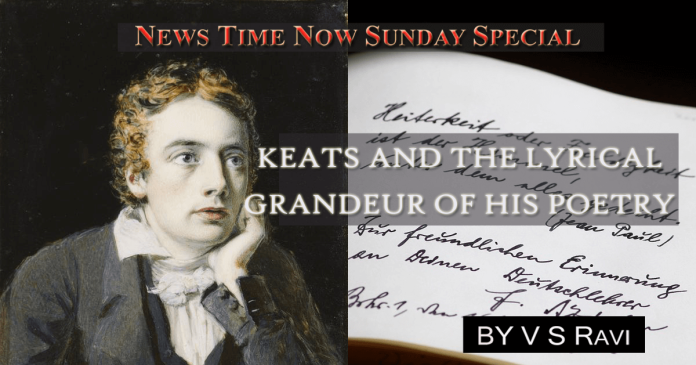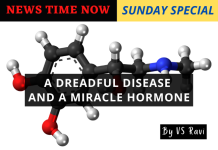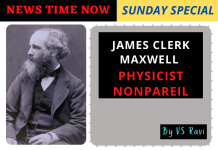Science may one day discover the laws that govern the births of great poets, but in the meantime, a birth like that of Keats, whose father worked as a hostler at the stables attached to the Swan and Hoop Inn, an establishment where the growing family lived for some years, continues to baffle scientists, and presents to the ordinary mind a striking instance of nature’s inscrutability.
If we consider the other chief poets of the time, we can commonly recognise either some strain of power in their blood, or some genetic factor, or some strong inspiring influence in the scenery and traditions of their home.
Thus we see Scott prepared alike by his origin, associations, and circumstances to be the ‘minstrel of his clan’ and poet of the romance of the border wilds; while the spirit of the Cumbrian hills, and the temper of the generations bred among them, speak naturally through the lips of Wordsworth ; Byron seems inspired in literature by demons of the same froward brood that had urged others of his lineage through lives of adventure or of crime ; But Keats, with greater poetical faculties than any of his contemporaries, was paradoxically born in a dull and middling walk of English city life.
Keats is today regarded as one of the great “passion poets” of English literature. Intellectually, Keats was strongly in tune with both Byron and Shelley. As far as religious philosophy, was concerned, he was really more extreme, more wholeheartedly pagan, in the poetic sense than either. Byron despite his cynical attitude, was unable to free himself entirely from the spell of Christianity, and Shelley’s so called atheism was far less obvious than his transcendental fervour. But Keats professed no religious beliefs, except the religion of beauty. He worshipped no God, except Pan, and Aphrodite; he sought consolation in the Earth, and he loved her with a passion, far more concrete and personal than that of even Wordsworth or Shelley. No other consideration except the thirst for beauty influenced his work. So Keats never allowed his poetry to be coloured by his political sympathies. He escaped from the mundane world into an enchanted realm of his own, jealously closed against the intrusion of ordinary human affairs. Shelley’s idealism was continually coloured by a revolutionary ardour. No such ardour influenced or affected the idealism of Keats, who took from Medievalism and Hellenism material for creating his sequestered haven of beauty. He used for sensual delight and not ethical inspiration, what he found there.
In the case of Scott, the appeal of the landscape lay in its historical association; in the case of Keats it lay in its beauty.
In the early stage of his poetical career Keats had not travelled much, to other places. Therefore in his sonnet” On first looking into Chapman’s Homer”, even though the opening line” Much have I travelled in the realms of gold”–seems to imply worldly riches, the name of Homer which appears later clearly shows that Keats was referring only to literary realms. Keats was aware and justifiably proud of his great knowledge of and insight into classical poetry. A further evidence of this can be seen in the“Ode to a Nightingale,”in the following lines, addressed to that bird:
“Away! away! for I will fly to thee,
Not charioted by Bacchus and his pards,
But on the viewless wings of Poesy”
Thus Keats was not only proud of his knowledge of literature but also the power of his own rhyme, which he felt would enable him to soar to the enchanted world of the Nightingale.
While Wordsworth concentrated on spiritualism and Shelley concentrated on the intellect, Keats passionately explored nature through the senses: the colour, the scent, the sound and the touch, were the things that stirred him to his depths. There is no mood of Earth that he did not love, no season that did not delight him and provide inspiration.
Just as Byron found the ultimate expression of his inmost self in “Don Juan”, Keats revealed his personality in his magnificent odes with his flights of fancy. However all the Odes do not stand on the same footing.“Ode on Indolence” has no great beauty to commend it, as it faithfully portrays a transient mood; in “Ode to Psyche”, Keats reveals his love for mythology like a master craftsman. But Keats reaches poetic perfection only in “Ode to a Nightingale”,“Ode on a Grecian Urn”, “Ode on Melancholy”, ” Ode to psyche”and” To Autumn” ”
“Ode to a Nightingale, the best of the five odes, and one of the greatest poems in the English language, represents in its passionate emotion the archetypical romantic genius, of Keats.
The expressions “full-throated ease”, “light-winged Dryad of trees”, “purple-stained mouth”, “leaden-eyed despairs” etc show the high water-mark of verbal perfection and of the concretisation of imagery . The phrases like “melodious plot”, “verdurous gloom” , “embalmed darkness” , “sun-burnt mirth” and “blushful Hippocrene’ impress the reader more for their poetry than for their meaning.
The lines
“I cannot see what flowers are at my feet,
Nor what soft incense hangs upon the boughs,
But, in embalmèd darkness, guess each sweet
Wherewith the seasonable month endows
The grass, the thicket, and the fruit-tree wild;
White hawthorn, and the pastoral eglantine;
Fast-fading violets cover’d up in leaves;
And mid-May’s eldest child,
The coming musk-rose, full of dewy wine,
The murmurous haunt of flies on summer eves”.
haunt the imagination by their openness and musical quality.
In the most quoted stanza of ” Ode to a Nightingale”
“Thou wast not born for death, immortal Bird!
No hungry generations tread thee down;
The voice I hear this passing night was heard
In ancient days by emperor and clown:
Perhaps the self-same song that found a path
Through the sad heart of Ruth, when, sick for home
She stood in tears amid the alien corn;
The same that ofttimes hath
Charm’d magic casements, opening on the foam
Of perilous seas, in faery lands forlorn”,
the musical effect of the last line :
“Charmed magic casements opening on the foam of perilous seas in fairy loved forlorn”
represents what scholars mean by the expression ” Keatsian magic”. It is unparalleled in the whole range of English poetry. As we read it we catch a glimpse of the romance of medieval times with the shadowy enchanters’ castle in a kingdom by the sea, the lonely tower of which encloses an imprisoned princess. The passage is indeed a wonderful example of perfect word painting. About this passage Rossetti says, “It shows a reach of expression which might almost be called the pillions of Hercules of human language”.
Let me now refer to the following stanza in ” Endymyon” which reflects obsession Keats’s with beauty
“A thing of beauty is a joy for ever:
Its loveliness increases; it will never
Pass into nothingness; but still will keep
A bower quiet for us, and a sleep
Full of sweet dreams, and health, and quiet breathing”
It is expressed more directly in the “Ode on a Grecian Urn”. He conveys the idea that human life and happiness may be ephemeral, but Art eludes Mortality and enshrines them with an ideal beauty, that goes beyond the grave.The lovers depicted on the Urn are all gone but Art and Poetry have given them immortality. Every Ode is a symphony of colour, sound, and movement.
Keats says in the last stanza of “Ode on a Grecian Urn”
” Heard melodies are sweet, but those unheard are sweeter”
opining that Art and Poetry are superior to music in sweetness. In his view beauty and truth are one and the same
I would regard the following lines as the greatest definition of beauty in all Poetry. Addressing the Grecian Urn he says
“When old age shall this generation waste,
Thou shalt remain, in midst of other woe
Than ours, a friend to man, to whom thou say’st,
“Beauty is truth, truth beauty”—that is all
Ye know on earth, and all ye need to know”.
Two other factors, overwhelmingly strong, one a wasting disease that ate into the physical texture of his body and other a deep longing for the embraces of Fanny Brawne, governed the life the life of Keats. These two passions, like great winds, blew him hither and thither, in a wayward course, over a great ocean of anguish, reaching to the very verge of despair. A clue to the pain caused by the illness that wracked his body, can be seen in the stanza where Keats cries out
” Fade far away dissolve and quite forget
What thou among the leaves hast never known
The weariness the fever and the fret
Here where men sit and hear each other grown;
Where palsy shakes a few sad lost grey hairs
Where youth grows pale and spectre- thin and dies;
Where but to think is to be full of sorrow
And leaden ey’d despairs
Where Beauty cannot keep her lustrous eyes
Or new Love pine at them beyond tomorrow”
He had bouts of coughing up blood, and continuous fever, that scalded his skin. His doctor misdiagnosed his ailment as mental illness caused by a stomach ailment. The medicines he prescribed were of no help to heal his tubercular lungs and Keats hurtled to his death.
Even as the fever ravaged his body, Keats’s obsessive sexual feelings for Fanny Brawne were not only unabated, but grew, in intensity. Unable as he was to physically consummate his union, because of his raging fever, he sublimated his unfulfilled desire, by writing a series of love letters, which are perhaps the most passionate, in the history of literature.
He was obviously thinking of Fanny Brawne, when he wrote the following lines in his best sonnet” Bright star” in which he explicitly expresses his desire to physically possess Fanny Brawne.
“No–yet still stedfast, still unchangeable,
Pillow’d upon my fair love’s ripening breast,
To feel for ever its soft fall and swell,
Awake for ever in a sweet unrest,
Still, still to hear her tender-taken breath,
And so live ever–or else swoon to die”
And in the first line of the “Ode on a Grecian Urn”he addresses it as
” Thou still unravished bride of quietness”.
Note his choice of the two words” unravished bride”. It would seem that Keats has unabashedly hinting that he lusted for Fanny Brawne. One tutored in the art of love does not ravish one’s bride but relieves her of the burden of virginity after a tender courtship. Keats, on the other hand, reveals the full intensity of his obsessive desire to violently plunder the loveliness of Fanny Brawne in those two words.
When Keats started writing his blank verse epic ‘ Hyperion” he expressed in all humility, his fond hope that after his death, he would be counted among the English poets. Now he is regarded as the archetypal Passion Poet, whose genius explored the limits of human imagination, and as one who realised more than any other poet of his age including Byron and Shelley, that beauty and truth were one and the same.
Commenting on the quality of the poetry of Keats, Matthew Arnold wrote
“Shakespearian work it is; not imitative, indeed, of Shakespeare, but Shakespearian, because its expression has that rounded perfection and felicity of loveliness of which Shakespeare is the great master”(It may be mentioned that Keats had great veneration for Shakespeare, whom he considered as his presiding Deity while writing Endymion).
and observed elsewhere again
“No one else in English poetry, save Shakespeare, has in expression quite the fascinating felicity of Keats, his perfection of loveliness. ‘ I think’ he said humbly, ‘ I shall be among the English poets after my death.’ He is; he is with Shakespeare”
But then Arnold himself had paid the ultimate tribute to Shakespeare in his famous sonnet:
“Others abide our question. Thou art free
We ask and ask: Thou smilest and art still
Out-topping knowledge .For the loftiest hill
That to the stars uncrowned his majesty,
Planting his steadfast footsteps in the sea
Making the Heaven of Heavens his dwelling-place
Spares but the cloudy border of his base.
To the foil’d searching of mortality:
And thou who didn’t the stars and sunbeams know
Self-schooled ,self-scann’d self-honour’d self-secure
Did walk on Earth unguess’d at .Better so!
All pains and immortal spirits must endure,
All weakness that impairs ,all griefs that bow,
Find their sole voice in that victorious brow”
In the above lines, Matthew Arnold, like the great Shakespearean scholar Logan Pearsall Smith, has unambiguously stated that while all other geniuses must” abide our question” i.e. await our verdict, Shakespeare alone is”free” i.e he is beyond all questions, analysis, scrutiny and judgment.
Arnold was of course only implying that Keats, in the sublimity of some of his great lines in a few poems, approached the genius of Shakespeare, and not that he was in actual fact equal to the Bard of Avon.So then, in the final analysis, one has to conclude that Keats occupies a very high place in the starry firmament of Poetry, and had he achieved his full potential would have been ranked second only to Shakespeare.


















































